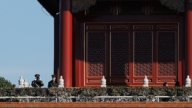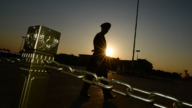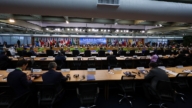【新唐人2013年03月14日讯】中共“两会”期间,新疆暴力事件不断,凸显大陆民族问题日益严重。有消息指称,当局已下令新疆全区公安和武警部队进入“一级戒备”,南疆部分地区实行宵禁,严禁居民夜间外出。中共高层权力交接后,新任领导人在民族问题上正面临新的挑战。
3月11号,“世界维吾尔代表大会”组织,在日内瓦举行关于中国民族问题的国际研讨会,来自21个国家和地区的近百人参加了会议。代表们强调,当前受压迫民族的团结协作与和平抗争非常重要。而为了避免冲突的延续和扩大,以习近平为首的中共新领导层,必须检讨和改变既有的民族政策。
目前新疆局势异常紧张。前几天网络消息说,新疆全区公安和武警部队已经进入最高戒备状态——“一级戒备”。这一消息得到了和田一名警察的确认。南疆部分地区则实行宵禁。阿克苏地区的居民说,当地凌晨1点到天明期间,警方一旦发现路人,立即盘查。
3月7号下午,新疆库尔勒市发生一起暴力事件。大陆官方声称,事件造成4人死亡,8人受伤,但拒绝透露死伤者和疑犯身份。有消息说,维族人与汉人发生口角后,持刀袭击汉人。另有消息人士指称,事件起因于一场赌博纠纷,疑犯在赌局输钱后随即拔刀砍人,属于普通刑事案件,但因为事件敏感,知情者不愿透露疑犯的种族身份。事发后库尔勒城区戒严,武警四处搜捕可疑人物。
香港《东方日报》报导,“库尔勒暴力事件”后,网传新疆喀甚、和田也发生类似事件。其中和田市有公安派出所遭到维族人袭击,被投掷汽油弹。
对此,大陆旅美民运人士蔡桂华向《新唐人》表示,大陆的民族问题由来已久,根本原因是中共一直实行民族沙文主义,对少数民族从文化、政治上进行压制,从经济、资源上进行破坏性的开发掠夺。
大陆旅美民运人士蔡桂华:“这样的结果,只能让这些少数民族地区中央集权的矛盾越来越(严重)。反抗的情况也会越来越严重。这是中央政府咎由自取造成的一个恶果。”
大陆“中央民族大学”哲学与宗教学系教授赵士林也认为,大陆当局应该向美国等国家学习,做到真正尊重少数民族文化。
中央民族大学哲学与宗教学系教授赵士林:“硬性的弹压在现代社会既不符合文明原则,同时也不能达到稳定的目地。还是要怀柔、还是要尊重人家,尊重人家的文化,尊重人家的经济和政治权利。这样才能有一种向心力,真正产生民族团结。”
赵士林还表示,根据他掌握的消息,当局有可能会对民族政策做出改变。
赵士林:“肯定是要有改变、有调整。民族自治权应该进一步落实,否则的话也是大麻烦。对过去的民族政策也有所反省吧,就是硬性的打压肯定不行。”
但蔡桂华对此表示怀疑,他认为,习近平、李克强等人继任中共高层领导人之后,直到目前还看不出中共少数民族政策有所改变。
“达赖喇嘛西藏宗教基金会”董事长达瓦才仁也表示,中共不大可能改变最根本的民族政策,那就是:宗教必须成为中共的工具,各民族的文化和语言也必须被中共同化。
达赖喇嘛西藏宗教基金会董事长达瓦才仁:“如果推行最根本的这些政策的话,那么其他政策的改变对整个实质的变化不会有大的(影响)。因为它的框架限定,一些小打小闹不会有实质性的效果。”
达瓦才仁强调,除非中国社会真正走向多元、开放,尊重各民族的宗教、语言和文化,否则如果中共继续沿用“胡萝卜加大棒”手段的话,不会有任何实质性意义。
采访/易如 编辑/李谦 后制/钟元
Xi’s New Challenge in Xinjiang
During Chinese Communist Party’s (CCP) two sessions
violent events occurred frequently in Xinjiang, highlighting the growing ethnic issues in China.
Sources alleged that public security and armed police forces
in Xinjiang have been ordered to enter Class A alert.
Part of southern Xinjiang had curfew,
non-residents weren’t allowed to go out at night.
After the power transfer of the top CCP level,
the leaders are facing new challenges on ethnic issues.
On March 11, the World Uyghur Congress held in Geneva
International Symposium on China’s ethnic problems.
Nearly hundred people from 21 countries and regions
attended the meeting.
Representatives emphasized the importance of unity,
cooperation and peaceful resistance by oppressed nations.
To avoid continuation and expansion of the conflict,
CCP’s new leadership headed by Xi Jinping must review and change existing national policies.
The current situation in Xinjiang is extremely serious.
According to online news, public security and armed police
forces in Xinjiang are at the highest state of alert, Class A.
The news was confirmed by a Hotan policeman.
Part of southern Xinjiang is under curfew.
For the Aksu area this is from 1am to dawn;
if police finds someone outside, they would immediate investigated him.
A violent incident occurred in the afternoon of March 7,
in Korla, Xinjiang.
The mainland official claimed that the incident caused
four deaths and eight injuries, but refused to disclose the victims’nd the suspects’identities.
Sources said, Uighurs and Han people quarreled,
and Uighurs got armed with knives to attack Han people.
Another source alleged that the event was
due to a gambling dispute.
After the suspect lost money in the gamble,
he immediately drew his knife and attacked Han people.
This is an ordinary criminal case. But since it is sensitive,
insiders don’t want to disclose the identity of the suspect.
After the incident, martial law was introduced in Korla,
the armed police searched for suspicious persons around.
Hong Kong’ Oriental Daily reported, after Korla’s violent
incident, Kashi and Hotan had similar incidents too.
Hotan local police stations have been attacked
by Uighurs, throwing petrol bombs.
Mainland’s pro-democracy activist Cai Guihua, living in US,
said China’s ethnic issues had a long history.
The fundamental reason is CCP’use of national chauvinism,
repressing minorities for their culture and politics,
and plundering their economy and resources,
which is damaging to their development, Cai thinks.
Cai Guihua: “This can only make the minority areas’
statist contradictions more and more (severe.)
Resistance will be more serious. These are consequences
caused by the central government."
Zhao Shilin is a professor in Philosophy and Religious Studies
at the Central University for Nationalities in China.
Prof. Zhao thinks China should learn from the US
and other countries, and truly respect minority’cultures.
Professor Zhao Shilin: “Hard repression in modern society
is not only inconsistent with the principles of civilization, but is also unable to achieve a stable resolution.
So one should be kind, respectful to other people and their
culture, as well as their economic and political rights.
This could be a centripetal force,
generating real national unity."
Zhao Shilin also said, according to his information sources,
the authorities may make a change to ethnic policies.
Zhao Shilin: “It certainly has to change and adjust.
The autonomous rights should be further implemented, or else there will be big troubles.
They should review the past ethnic policies;
hard suppression will certainly not do."
But Cai Guihua expressed doubts; after Xi-Li took power
as CCP’ and China’ senior leaders he did not see any changes in CCP’s minorities policies.
Dawa Tsering, chairman of the Dalai Lama Tibet Religious
Foundation, also said, the CCP is unlikely to change its most fundamental ethnic policy.
That is, religion must become a tool of the CCP, different
cultures and languages must also be embraced by the CCP.
Dawa Tsering: “Implementing the most fundamental
policies will not make a big (impact) on the whole.
Because of its framework, some small changes
will not have substantial effects."
Dawa Tsering stressed that the Chinese society needs to
really become diverse and open, respecting religions, languages, and cultures of various ethnic groups.
Otherwise, if CCP continues to follow the ‘carrot and stick’
approach, there will be no substantial change.




























